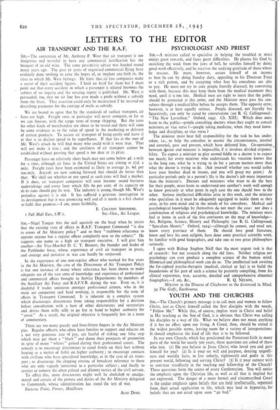SIR,—Nigel Tangye hits the nail squarely on the head when
he insists that the existing etate of affairs in R.A.F. Transport Command " is due to errors of Air Ministry policy " and .to their " stubborn reluctance to appoint anyone but a regular officer completely new to the subject." He suggests one name as a high air transport executive. I will give him another—Air Vice-Marshal D. C. T. Bennett, the founder and leader of the Pathfinder force, whose experience of civil air transport in peace, and courage and initiative in war can hardly be surpassed.
In the experience of one non-regular officer who worked for five years in the Air Ministry, the case of the Directorate of Air Transport Policy is but one instance of many where reluctance has been shown to make adequate use of the vast store of knowledge and experience of professional and commercial affairs brought to Service Departments by members of the Auxiliary Air Force and R.A.F.V.R. during the war. Even so, it is doubtful if trades unionism amongst professional airmen, who in the main are competent and hard working, is responsible for the state of affairs in Transport Command. It is inherent in a complex system which discourages directorates from taking responsibility for a decision before consultation with a host of other directorates and secretariats and drives them willy nilly to go hat in hand to higher authority for " cover." As a result, the original objective is frequently lost in a maze of commentary.
There are too many greedy and frost-bitten fingers in the Air Ministry pies. Regular officers, who often have families to support and educate on a not very generous rate of pay, are fearful of risking one false step which may get them a " black " and damn their prospects of promotion in spite of many " whites " gained during their professional career. The remedy is to encourage directorates to stand firmly on their feet without leaning as a matter of habit on higher authority ; to encourage contacts with civilians who have specialised knowledge, as in the case of air trans- port ; to discourage the clogging routine of broadcast reference to those who are only vaguely interested in a particular subject ; and finally to restrict or remove the often palsied and dilatory tactics of the civil servant.
To effect this, more directorates might well be abolished or amalga- mated and certain of the powers and duties of the Air Ministry delegated to Commands, whose administration has stood the test of war.
Eastcote Point, Pinner, Middlesex.
ALAN DORE.






























 Previous page
Previous page